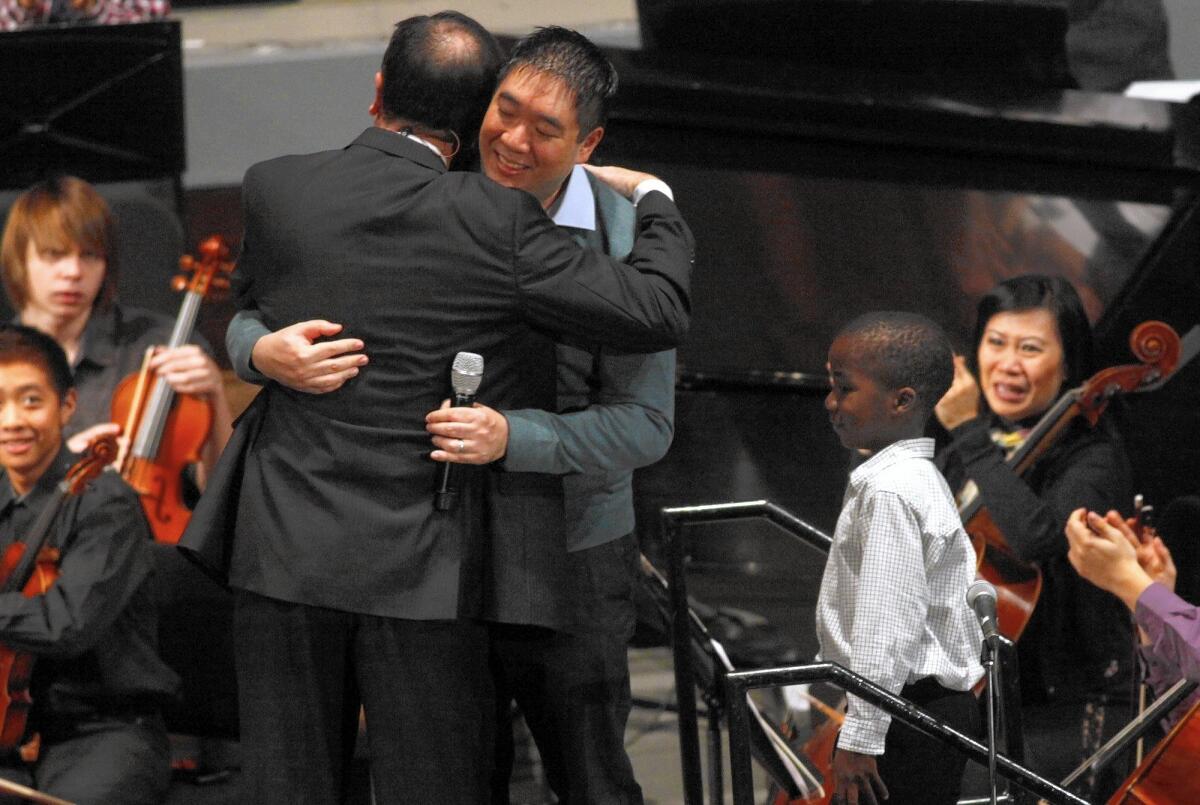Couple jailed in Qatar after adopted daughter’s death sue employer

- Share via
A San Gabriel Valley couple trapped in Qatar for nearly two years after their daughter’s death filed suit Monday against the engineering firm that sent them overseas, alleging it failed to provide security or cultural training to help them survive in a country where mixed-race families are not accepted.
Matt and Grace Huang, Asian Americans who adopted three black children from Africa, said they suffered profound psychological trauma and were left more than $2 million in debt after being wrongly accused of killing their 8-year-old daughter, who died from an eating disorder when they lived in Doha, the capital of Qatar.
Instead of helping them after they were jailed and separated from their sons, Colorado-base MWH Global abandoned them and forced Matt Huang to quit his job, according to the lawsuit.
Huang, who had worked for the engineering firm since 1999, was sent to Qatar to help improve the country’s infrastructure ahead of the 2022 FIFA World Cup soccer games.
Matt Huang said in the suit that he was physically and sexually attacked while in a prison and that the couple continued to fear for their safety after they were released, resorting to wearing disguises on the rare days they went out in public.
The lawsuit, filed in Los Angeles Superior Court, accuses MWH Global of negligence, wrongful termination and infliction of emotional distress. The Huangs, who sold their home in Temple City while overseas to pay legal bills, returned to California last week after being cleared of wrongdoing.
In a statement, MWH said it was “disappointed” by the lawsuit and had provided immediate and generous assistance within hours of the couple’s detention. The company said it spent hundreds of thousands of dollars on Matt Huang’s criminal defense.
“MWH met with U.S. Embassy officials, helped arrange legal counsel, checked in on the welfare of Matt and Grace and their children and attended initial court hearings.”
The firm also said it offered Matt Huang a leave of absence from his job so that he could come back to work when his legal difficulties were resolved. Instead, the company said, Huang decided to resign.
A civil engineer with a master’s degree from Stanford, Huang said he had previously received hazard pay and training when dispatched to take on projects in Palestine and Israel but was given no advice when he was sent to Qatar in 2012 to help the tiny country improve its drainage system.
The Huangs, the suit said, unknowingly arrived in a country where adoption is prohibited and East Asians are regarded as one of the lowest “racial classes of individuals.”
The couple’s life was upended in January 2013 when Matt Huang came home from work and found daughter Gloria collapsed on her bedroom floor, the suit said. The girl, born in Ghana, had been diagnosed with giardiasis, a parasitic infection that causes loss of appetite and violent vomiting. The child would go days without a meal and then binge-eat, the suit said.
The girl died after her father rushed her to an emergency room. Hours later, the couple were arrested, charged in their daughter’s death and accused of planning to sell her organs on the black market, the suit said. The Huang’s two sons were put in an orphanage, though they were later permitted to return to the United States and live with the couple’s family.
Police reports said the Huangs had no legitimate reason to adopt children who were not “good looking” and who did not share their “hereditary traits.”
According to the lawsuit, Matt Huang’s employers hired a local lawyer to represent him but failed to disclose that the attorney worked with the Qatari government. They said they never met the lawyer and eventually hired an international crisis management firm, David House Agency, to help win their freedom.
“It’s very important to Matt and Grace to set a precedent — to make sure there’s some sort of guidance for companies sending employees to dangerous places. There should be strict rules that they’re required to educate people and families so they’re prepared when they enter high-risk locations,” said William Turner, the family’s lawyer.
Turner describes his clients’ ordeal as “unimaginable.”
“I can’t comprehend it,” Turner said. “It’s a true nightmare that they don’t want others to experience.”
Twitter: @newsterrier
More to Read
Sign up for Essential California
The most important California stories and recommendations in your inbox every morning.
You may occasionally receive promotional content from the Los Angeles Times.










